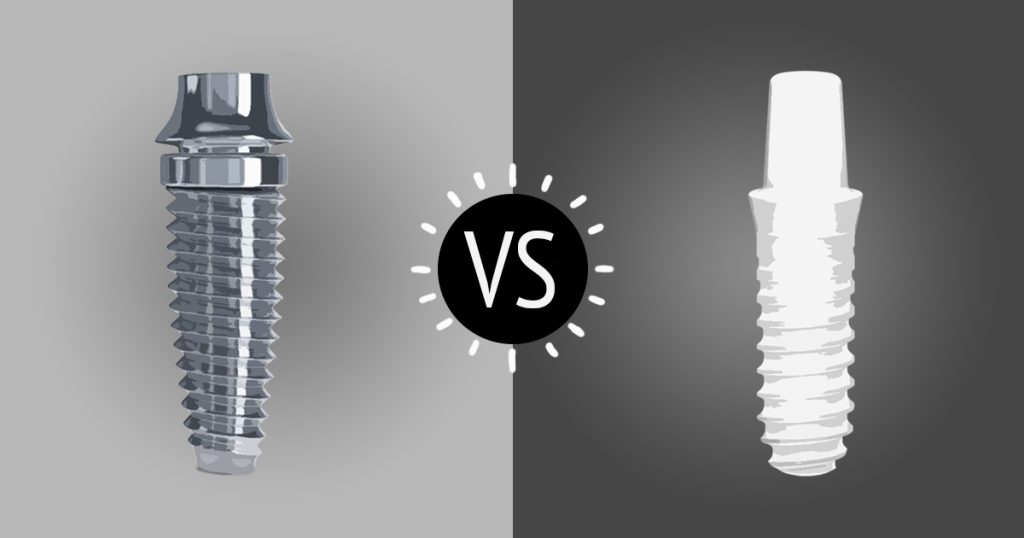Titanium vs. Zirconium: Which is the Best Material for Dental Implants?

Dental implants have revolutionized modern dentistry, offering a long-lasting solution for missing teeth. However, choosing the right material is crucial for long-term success. The two most popular materials for dental implants are titanium and zirconium, each with unique advantages and considerations. In this article, we’ll explore the differences between these materials, their benefits, and which option might be best for different types of patients.
What Are Titanium and Zirconium Dental Implants?
Titanium Implants
Titanium has been the gold standard for dental implants since the 1960s due to its exceptional biocompatibility and durability. These implants consist of pure titanium or titanium alloys, which allow them to integrate seamlessly with the jawbone in a process called osseointegration.
Zirconium Implants
Zirconium, or zirconia, is a relatively newer material in implant dentistry. It is a metal-free, ceramic-based material that has gained popularity due to its aesthetic advantages and hypoallergenic properties. Zirconium implants offer a one-piece, tooth-colored alternative to traditional titanium implants.
Key Differences Between Titanium and Zirconium Implants
1. Biocompatibility and Osseointegration
Titanium: Proven track record of excellent osseointegration, forming a strong bond with bone, reducing implant failure rates.
Zirconium: Also biocompatible but with fewer long-term studies proving its osseointegration effectiveness compared to titanium.
2. Strength and Durability
Titanium: Extremely strong and resistant to fractures, making it ideal for long-term use.
Zirconium: Brittle compared to titanium and more prone to fractures, especially under high stress.
3. Aesthetics
Titanium: Can sometimes cause a grayish appearance near the gumline, especially in patients with thin gums.
Zirconium: White and tooth-colored, making it the superior aesthetic choice, especially for front teeth replacements.
4. Allergies and Sensitivities
Titanium: Rarely causes allergic reactions but may not be suitable for patients with metal sensitivities.
Zirconium: 100% metal-free, making it an excellent choice for patients concerned about metal allergies.
5. Implant Design and Placement
Titanium: Typically a two-piece system, allowing for more flexibility in positioning and easier adjustments.
Zirconium: Usually a one-piece system, limiting customization and making the procedure more technique-sensitive.
Which Material Is Best for You?
The choice between titanium and zirconium depends on various factors, including the patient’s health, aesthetic needs, and lifestyle.
Titanium is better for:
Patients who need strong, long-lasting implants.
Those requiring implants in the back of the mouth where higher chewing forces are applied.
Individuals looking for a more affordable and proven implant option.
Cases requiring complex dental work with multiple implants.
Zirconium is better for:
Patients with metal allergies or sensitivities.
Those looking for a highly aesthetic, metal-free solution, especially for front teeth.
Individuals who prefer a holistic or non-metal approach in dentistry.
Patients with thin or receding gums where titanium implants may become visible.
Frequently Asked Questions (FAQs)
1. Are zirconium implants as strong as titanium implants?
Zirconium is strong but more brittle than titanium, making it more prone to fractures. Titanium remains the better choice for long-term durability, especially in high-pressure areas.
2. Do titanium implants cause allergic reactions?
Allergic reactions to titanium are extremely rare. However, in some cases, patients with metal sensitivities might experience mild irritation, in which case zirconium could be a better option.
3. Which implant has a higher success rate?
Titanium implants have a longer track record of success, with studies showing a success rate of over 95%. Zirconium implants show promising results, but long-term studies are still limited.
4. Can I replace my titanium implant with a zirconium one?
Yes, but it involves a surgical procedure to remove the titanium implant and replace it with a zirconium one. This is only recommended if medically necessary.
5. Are zirconium implants more expensive than titanium implants?
Yes, zirconium implants tend to be more expensive due to their aesthetic benefits and the complexity of their manufacturing process.
Which Should You Choose?
Both titanium and zirconium implants have their advantages and drawbacks. Titanium remains the most reliable and widely used option due to its durability and high success rates. However, zirconium is an excellent alternative for patients with aesthetic concerns or metal sensitivities.
Want to find the best implant for your needs? Schedule a consultation today and let an expert guide you to the perfect solution for your smile!

